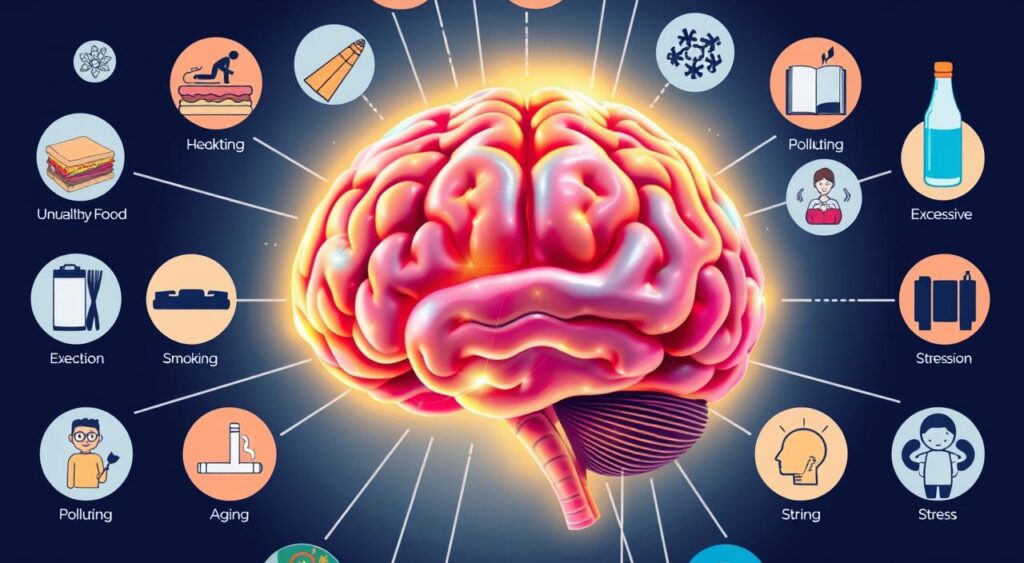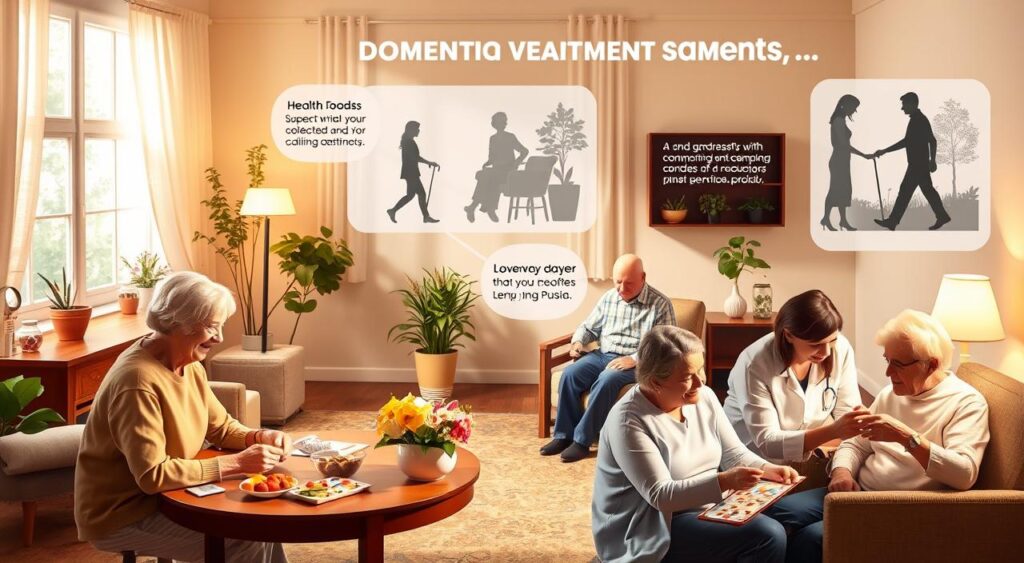
Every 3 seconds, a new case of dementia emerges, affecting 55 million people worldwide. This shows how vital it is to grasp cognitive impairment and its effects on families.
Dementia is a complex brain disorder that worsens over time. It affects memory, thinking, and daily tasks. Unlike normal aging, dementia severely impacts a person’s mind, causing big problems for both patients and their caregivers.
Cognitive impairment shows in many ways, from mild memory issues to serious problems with communication and reasoning. Spotting these symptoms early can help manage the condition and slow its progress.
Key Takeaways
- Dementia affects millions globally, with increasing prevalence
- Early detection is crucial for effective management
- Memory loss goes beyond normal aging processes
- Comprehensive understanding helps develop better support strategies
- Multiple types of dementia exist with unique characteristics
Understanding Dementia and Its Impact on Brain Health
Dementia is a group of brain disorders that change how we think and act. It affects millions globally, causing big problems for families and healthcare. This condition is a major challenge.
The Progressive Nature of Cognitive Decline
Dementia makes our brains work less well over time. It slowly takes away our mental skills. This includes:
- Memory loss
- Reduced problem-solving skills
- Decreased communication abilities
- Impaired reasoning and judgment
“Understanding the progression of cognitive decline is crucial for early intervention and management.” – Neuroscience Research Institute
How Dementia Affects Daily Living
Dementia makes everyday tasks hard. People with it find it hard to do simple things like:
| Life Area | Impact Level | Typical Challenges |
|---|---|---|
| Personal Care | High | Bathing, dressing, eating |
| Social Interaction | Moderate | Communication difficulties |
| Independent Living | Severe | Reduced decision-making capacity |
Global Statistics and Prevalence
More and more people are getting dementia. About 50 million worldwide have it, and this number is expected to triple by 2050.
Early Warning Signs of Cognitive Impairment
It’s important to notice early signs of memory loss and cognitive decline. Our brains change as we age. Small changes in how we think can mean we need to act fast.
Spotting these signs early lets us take steps to understand and manage them. This is key for both individuals and their families.
- Frequent short-term memory challenges
- Difficulty completing familiar tasks
- Persistent confusion about time or place
- Struggle with language and communication
- Noticeable changes in mood or behavior
“Early detection of cognitive changes can significantly improve management and quality of life.” – Dr. Rachel Thompson, Neurological Research Institute
As we age, our brains may slow down a bit. This doesn’t always mean we have a serious problem. But if memory loss keeps happening, it’s time to see a doctor.
| Symptom | Potential Significance | Recommended Action |
|---|---|---|
| Forgetting recent conversations | Possible early memory impairment | Cognitive assessment |
| Getting lost in familiar areas | Potential spatial reasoning decline | Medical consultation |
| Repeating questions | Short-term memory challenges | Neurological screening |
Doctors say to get checked out if you notice many signs. Things like family history, how you live, and your health play a big role in keeping your brain sharp.
Common Types of Neurodegenerative Disorders
Neurodegenerative disorders are a big focus in medical research, especially dementia. These conditions affect millions, slowly harming brain health and thinking skills.
Knowing about different neurodegenerative disorders helps us understand their unique traits. It also shows us how to manage them better.
Alzheimer’s Disease Characteristics
Alzheimer’s is the most common neurodegenerative disorder, making up 60-80% of dementia cases. It’s marked by:
- Progressive memory loss
- Cognitive decline
- Neurological protein accumulation
- Gradual brain cell deterioration
“Alzheimer’s is not just memory loss, but a complex neurological transformation affecting entire neural networks.” – Neuroscience Research Institute
Vascular Dementia Overview
Vascular dementia happens when blood flow to the brain is cut off. This leads to:
- Sudden cognitive changes
- Movement difficulties
- Emotional instability
Lewy Body Dementia Explained
Lewy body dementia is unique, with protein deposits affecting brain function. Symptoms include:
Visual hallucinations and changing thinking skills.
| Disorder Type | Primary Symptoms | Progression Rate |
|---|---|---|
| Alzheimer’s | Memory Loss | Slow |
| Vascular Dementia | Cognitive Interruption | Variable |
| Lewy Body Dementia | Hallucinations | Moderate |
Each neurodegenerative disorder has its own challenges. This makes early detection and tailored medical care crucial.
Risk Factors and Prevention Strategies

Knowing the risks for cognitive impairment is key to keeping our brains healthy as we age. The older we get, the more our brains face challenges that can affect how we think.
“Prevention is the best medicine when it comes to protecting your cognitive abilities.” – Neuroscience Research Institute
Many things can lead to cognitive decline and even dementia. By knowing these risks, we can take steps to protect our brains.
Key Risk Factors
- Advanced age
- Genetic predisposition
- Cardiovascular health issues
- Chronic medical conditions
- Lifestyle choices
Prevention Strategies
To prevent cognitive impairment, we need a plan that covers many areas of health and lifestyle.
| Strategy | Impact on Brain Health |
|---|---|
| Regular Physical Exercise | Improves blood flow, reduces inflammation |
| Balanced Nutrition | Provides essential nutrients for brain function |
| Mental Stimulation | Builds cognitive reserve, promotes neuroplasticity |
| Social Engagement | Reduces risk of depression, supports cognitive health |
By taking proactive health strategies, we can lower our risk of cognitive impairment. Regular health checks, a healthy lifestyle, and staying mentally active are crucial for brain health.
Lifestyle Recommendations
- Engage in regular physical activity
- Maintain a heart-healthy diet
- Practice stress management techniques
- Get adequate sleep
- Stay socially connected
While we can’t completely stop cognitive decline, these steps can greatly reduce the risk. They help keep our brains healthy as we age.
The Role of Genetics in Dementia Development
Genetics are key in understanding Alzheimer’s and other brain diseases. Scientists have found that some genetic changes can raise a person’s risk of brain problems. Even though genetics aren’t the only factor, they help us understand how dementia starts and grows.
Hereditary Factors in Neurodegenerative Disorders
Families with Alzheimer’s often share certain genes that make them more likely to get it. Researchers have found important genes that can make people more at risk for brain diseases:
- APOE-e4 gene variant
- Presenilin 1 and 2 mutations
- Amyloid precursor protein (APP) gene changes
“Understanding genetic risk factors is not about predetermination, but prevention and preparedness.” – Neuroscience Research Institute
Genetic Testing and Counseling
Genetic testing lets people know their risk for brain health issues. Genetic counselors can explain test results and offer advice on:
- Personal risk assessment
- Potential preventive strategies
- Family planning considerations
Even though genetic tests can’t say for sure if someone will get dementia, they help people make smart health choices. They can also lead to early actions to prevent or slow down the disease.
Diagnostic Process and Assessment Methods
Diagnosing neurodegenerative disorders needs a detailed and thorough approach. Doctors use many methods to spot cognitive and memory issues. They start by looking at the patient’s medical history, doing physical checks, and running special tests.
“Early and accurate diagnosis is crucial for developing effective treatment strategies and managing neurodegenerative disorders.”
The main ways to diagnose include:
- Comprehensive medical history review
- Neurological examination
- Cognitive screening tests
- Neuropsychological assessments
- Brain imaging techniques
Neurologists and geriatric specialists follow a detailed process. They check cognitive function and look for other conditions that might cause memory loss symptoms.
| Assessment Type | Purpose | Key Indicators |
|---|---|---|
| Mini-Mental State Exam (MMSE) | Screening for cognitive decline | Memory, orientation, attention |
| Montreal Cognitive Assessment | Detect mild cognitive impairment | Executive function, language skills |
| MRI Brain Scan | Structural brain analysis | Brain shrinkage, lesions |
Genetic tests and blood work help understand risk factors for neurodegenerative disorders. Doctors carefully look at these results to make a personal diagnosis.
People with suspected cognitive issues should get regular checks. This helps track any changes and adjust treatment plans.
Memory Loss Patterns and Progression
Memory loss is a complex challenge in understanding cognitive impairment. Brain health deteriorates in distinct patterns, affecting memory. Recognizing these changes helps doctors track neurological conditions’ progression.
Cognitive impairment shows through different memory loss stages. These can be categorized into specific patterns:
- Early stage: Mild forgetfulness
- Middle stage: Increasing difficulty recalling recent events
- Advanced stage: Significant memory disruption
Short-term vs. Long-term Memory Impact
Memory loss usually starts with short-term memory challenges. People might forget recent conversations, appointments, or new information. Long-term memory often stays stable in the early stages of cognitive decline.
| Memory Type | Early Signs | Progression |
|---|---|---|
| Short-term Memory | Forgetting recent events | Rapid deterioration |
| Long-term Memory | Retaining childhood memories | Gradual fragmentation |
Cognitive Function Assessment Tools
Doctors use standardized tools to evaluate memory loss and cognitive impairment. These diagnostics help track brain health and develop targeted strategies.
- Mini-Mental State Examination
- Montreal Cognitive Assessment
- Clock Drawing Test
“Understanding memory loss patterns is crucial for early intervention and comprehensive care.” – Neuroscience Research Institute
Early detection and comprehensive assessment are key in managing memory-related cognitive challenges.
Treatment Approaches and Management Strategies

Managing dementia needs a detailed plan that covers both medical and emotional sides. Good treatment aims to keep the patient’s life quality high. It helps them face their cognitive challenges.
“The goal of dementia care is not just to treat symptoms, but to enhance the patient’s overall well-being and dignity.” – Alzheimer’s Research Experts
Caring for someone with dementia involves many steps:
- Medicines to handle cognitive symptoms
- Non-medical ways to support behavior
- Custom care plans for each person
- Emotional support for patients and their families
Alzheimer’s treatment is complex. Medicines can tackle certain symptoms. But, non-drug therapies are key for brain health and feeling good.
Important management strategies are:
- Cognitive stimulation therapy to keep the mind active
- Daily routines that offer comfort and predictability
- Changes to the environment for safety
- Regular check-ups and assessments
Caregiving is vital in managing dementia. Families and professional caregivers must team up. They create a supportive space that boosts the patient’s independence and life quality.
Medications and Therapeutic Interventions
Managing neurodegenerative disorders like Alzheimer’s needs a full approach to brain health. Treatment plans include many medications and therapies. They aim to slow down cognitive decline and boost patient quality of life.
FDA-Approved Treatments
Several drugs have been approved to tackle symptoms of neurodegenerative disorders. These medicines focus on different brain functions to help with cognitive challenges.
- Cholinesterase inhibitors like donepezil help keep cognitive abilities sharp
- Memantine slows down brain cell damage
- Combination medications manage symptoms fully
Alternative Medicine Options
Complementary methods can help alongside traditional treatments for brain health. Patients might look into different alternative treatments with their doctor’s guidance.
| Alternative Treatment | Potential Benefits | Considerations |
|---|---|---|
| Ginkgo Biloba | Potential memory enhancement | Limited scientific evidence |
| Omega-3 Supplements | Supports brain function | Needs regular intake |
| Acupuncture | Reduces stress | Response varies by individual |
*”Understanding treatment options is crucial for managing neurodegenerative disorders effectively.”*
It’s vital to talk to neurological specialists. They help create treatment plans that fit each patient’s needs and how their disease is progressing.
Lifestyle Modifications for Brain Health
As we get older, keeping our brains healthy is more important than ever. Our brains need smart lifestyle choices to fight off mental decline and stay sharp. Studies show that making the right changes can greatly improve our brain health.

There are key lifestyle changes that can help protect our brains and slow down mental aging. Experts say we should focus on many areas of wellness:
- Regular physical exercise
- Balanced nutritional intake
- Mental stimulation activities
- Social engagement
- Quality sleep patterns
“Prevention is the best medicine for maintaining cognitive function,” states Dr. Rachel Thompson, neurological research specialist.
Exercise is a big player in brain health. Just 30 minutes of moderate exercise a day can boost brain connections and lower the risk of mental decline.
| Activity Type | Cognitive Benefits | Recommended Frequency |
|---|---|---|
| Aerobic Exercise | Enhances neuroplasticity | 3-5 times weekly |
| Strength Training | Improves brain connectivity | 2-3 times weekly |
| Mental Puzzles | Stimulates cognitive function | Daily |
What we eat also matters a lot for our brain health. Eating foods rich in omega-3s, antioxidants, and whole grains can help protect our brains and slow down aging.
- Mediterranean diet shows promising neuroprotective effects
- Reducing processed foods supports brain wellness
- Staying hydrated maintains cognitive performance
Keeping our minds active through learning, socializing, and challenging activities helps build strong brain connections. This helps us stay mentally sharp as we age.
Caregiving Essentials and Support Systems
Dealing with dementia caregiving is tough. It needs a deep understanding and strong support systems. Family and professional caregivers are key. They offer vital help and care to those with memory loss.
Family Caregiver Resources
Caring for a loved one with dementia is a big job. It takes a lot of emotional and physical effort. Families need good resources to handle this tough journey well.
- Join local and online support groups
- Attend caregiver training workshops
- Utilize respite care services
- Connect with dementia care counselors
“The most important quality in a caregiver is compassion paired with knowledge.” – Alzheimer’s Association Expert
Professional Care Options
Professional memory care services provide special help for those with cognitive issues. These services range from part-time home care to full-time care in facilities.
- In-home nursing care
- Adult daycare centers
- Specialized memory care facilities
- Geriatric care management
Choosing the best caregiving option means looking closely at the person’s needs and how their dementia is progressing.
Environmental Adaptations for Safety

Creating a safe environment is key for those with cognitive decline. Caregiving for an aging brain means making home changes to reduce risks and support independence.
The main aim of memory care safety adaptations is to lower risks while keeping dignity and autonomy. This is vital for individuals with dementia.
- Remove tripping hazards like loose rugs
- Install grab bars in bathrooms
- Improve lighting in hallways and staircases
- Use contrasting colors for better visual perception
- Secure dangerous items like medications and cleaning supplies
Technological innovations can greatly improve home safety for those with memory impairments. Smart home devices offer extra protection and monitoring.
“Safety is not about restricting freedom, but creating an environment where individuals can thrive with confidence.” – Dementia Care Experts
Key technological interventions include:
| Technology | Safety Benefit |
|---|---|
| Motion Sensors | Detect unusual movement patterns |
| GPS Tracking Devices | Monitor wandering risks |
| Automatic Shut-off Appliances | Prevent potential fire hazards |
By adding these environmental adaptations, safety and quality of life can greatly improve for those facing memory care challenges.
Latest Research and Clinical Trials
The world of neurodegenerative disorders research is changing fast. This brings new hope to those with Alzheimer’s and related conditions. Scientists are looking into new ways to fight brain health problems.
New studies are looking at fresh ways to tackle these complex diseases. Researchers are exploring new treatments that could change how we care for patients.
Emerging Treatments
New research is showing promising treatments for Alzheimer’s and other brain diseases:
- Precision medicine targeting specific genetic markers
- Advanced immunotherapy methods
- Strategies to grow new brain cells
- New ways to deliver drugs
“We are on the cusp of transformative breakthroughs in brain health research,” says Dr. Elizabeth Roberts, lead neurological researcher at Stanford University.
Promising Studies
Current trials are looking at exciting new treatments:
- Medicines that fight protein buildup
- Non-invasive brain stimulation
- Personalized treatment plans
- Early detection tests
The future of treating neurodegenerative disorders looks bright. Researchers around the world are working together to find new answers and solutions.
Legal and Financial Planning Considerations
Dealing with dementia care needs careful planning and quick action. Families must tackle important legal steps to safeguard their loved ones. This ensures they get the support they need.
Here are some key legal steps for dementia care:
- Setting up power of attorney for money and health decisions
- Creating advance healthcare directives
- Writing down long-term care wishes
- Organizing a detailed estate plan
“Early legal planning can prevent future complications and provide peace of mind for families dealing with dementia.”
Managing memory care costs is also vital. Families should look into different funding options to help with caregiving expenses.
| Funding Source | Coverage Details |
|---|---|
| Medicare | Limited long-term care coverage |
| Medicaid | Comprehensive support for low-income individuals |
| Long-term Care Insurance | Specialized coverage for dementia care |
| Veterans Benefits | Additional support for eligible veterans |
Talking to an elder law attorney who knows about dementia care is wise. Proactive planning reduces stress and ensures the best care for those with cognitive decline.
Conclusion
Dementia is a complex brain challenge that needs deep understanding and early action. Our journey has shown us how brain health matters. It affects not just the person but also their loved ones deeply.
Looking into Alzheimer’s and other brain diseases shows us the value of early signs and tailored care. New tests and treatments give hope for better lives and new treatments.
People dealing with dementia should stay informed and get help from experts. Building strong support groups and staying active can help slow down the disease. This keeps the brain healthy.
Though the fight against dementia is tough, research, care, and new tech offer hope. Knowing, caring, and acting early are our best weapons against this disease.
FAQ
Q: What is the difference between dementia and Alzheimer’s disease?
A: Dementia is a term for many cognitive problems. It affects memory, thinking, and social skills. Alzheimer’s is the most common dementia type, making up 60-80% of cases.
Alzheimer’s is a form of dementia. But not all dementia is Alzheimer’s. Other types include vascular dementia, Lewy body dementia, and frontotemporal dementia.
Q: What are the early warning signs of cognitive decline?
A: Early signs include memory loss and trouble with daily tasks. You might get confused about time or place. Problems with language and judgment are also signs.
Withdrawal, mood changes, and losing things often are warning signs. If you see these in yourself or a loved one, see a doctor.
Q: Can dementia be prevented?
A: Preventing dementia is not guaranteed. But, some lifestyle changes can help. Regular exercise and a healthy diet are key.
Stay mentally and socially active. Manage heart risks and get enough sleep. Avoid smoking and too much alcohol.
Q: How is dementia diagnosed?
A: Diagnosis involves a detailed evaluation. This includes medical history and cognitive tests. Doctors also do neurological exams and brain scans.
They use these tools to figure out the type and stage of dementia. This helps rule out other conditions.
Q: What treatment options are available for dementia patients?
A: Treatment includes medications and therapy. Cholinesterase inhibitors and memantine help manage symptoms. Cognitive stimulation and occupational therapy are also used.
Non-pharmacological interventions are important. The goal is to improve quality of life and support cognitive function.
Q: How does genetics impact dementia risk?
A: Genetics can raise dementia risk, especially for familial Alzheimer’s. But, having a genetic risk doesn’t mean you’ll get it. Lifestyle and environment also play big roles.
Some genes, like APOE-e4, increase risk. But, they don’t guarantee disease. Environmental factors are also crucial.
Q: What support is available for caregivers?
A: Caregivers can find support through local groups and online resources. Respite care, counseling, and organizations like the Alzheimer’s Association are available. Many communities offer training and support networks.
These resources help with the emotional and practical challenges of caregiving.
Q: How can families create a safe environment for a loved one with dementia?
A: Creating a safe space involves removing hazards and using clear signs. Keep routines consistent and install safety devices like grab bars. Ensure good lighting and secure dangerous items.
Use color-coded or labeled systems to help with orientation and independence.
